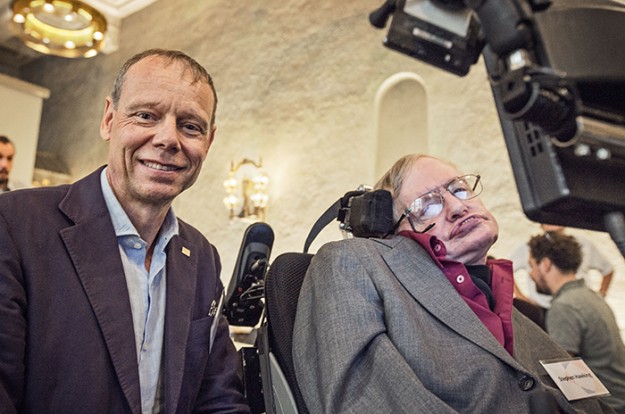
There might not be an astronaut wedding this year, but the annual Association of Space Explorers XXVIII Planetary Congress at KTH Royal Institute of Technology will nevertheless be something truly unique.
The conference of 100 astronauts will be hosted for two days at KTH, September 21 and 22, during which there will be a grand inaugural of the Dome of Visions building, and a number of technical presentations and lectures.
I chatted with Christer Fuglesang, Sweden’s first astronaut and an adjunct professor here at KTH, about the upcoming conference, which involves a significant number of the world’s most experienced space travelers.
DC: What’s the ASE Planetary Congress all about?
CF: We have about 100 astronauts and cosmonauts coming to Sweden for this annual event. Some of our goals for the conference are to maintain our network and to meet and discuss matters involving space exploration. We have technical presentations on space life and space research, and we make these open to the public. They’ll be streamed live online, too, so anyone to listen to them — not just astronauts.
And, very importantly, we have a community day when astronauts visit local schools and universities and talk about their experience and inspire young people. That’s why in Sweden, we’re calling this year’s conference, “Inspired by Space”. We’ll also have a live Q&A online with four astronauts, where students of all ages can submit questions about what it is like to work, and live, in space.
Our final goal is to show these prominent people the very best of Sweden, highlighting our industry, culture and nature. Most of the astronauts bring their spouses, and they get a nice program too, with more of the nature and cultural exposure.
You get to meet colleagues from all around the world, and you have this informal exchange of ideas and knowledge, plus there are great presentations on the latest in space development and research. Then you also get to experience a different country.
DC: Why is it important to keep the space explorers’ network active?
CF: We believe that we can have some influence on the future of spaceflight, and we believe that more people will listen to us when we talk about space research, as well as problems on Earth. It’s easy for astronauts to get heard; and by meeting, we can help each other formulate this message and make it even stronger by coordinating it.
One of the issues we are pushing quite hard on is the threat of asteroids and meteors. There are a lot of heavenly bodies out there and sometimes they hit Earth. And, unfortunately we have not made enough of an effort to try to detect and observe more of them and to have an action plan for deflecting asteroids.
Close to 1,000 of people were injured when the Chelyabinsk asteroid hit Russia without warning a few years ago. But a potentially more catastrophic impact event was the Tunguska meteor in 1908. If it had hit a city — and today we have more and more big cities — it could have killed millions of people.
DC: So you have lots of professional knowledge sharing there. But besides that, what is it like when astronauts get together? It seems like a very special group of people.
CF: Well, you do have a certain special affinity with one another — a special togetherness because you shared something that few people get the chance to do. From space you have seen the Earth and experienced weightlessness.
DC: You’ve been to several of these conferences. What highlights stand out in your memory?
CF: I have been to six of these. There were a couple of events that really stand out. When Malaysia hosted the ASE, one of the Malaysian astronauts was getting married at the conclusion of the conference, and we were all invited. It was a huge event. And in Saudi Arabia, it was very interesting to see the investment in education there. It’s always interesting to share our experiences in other countries and by doing this we help to create understanding between cultures throughout the world.
After all, it’s one globe. You see it from up there, and you talk about that and travel the world and share these values of working together and cooperation.
David Callahan
The ASE XXVIII Planetary Congress begins with an opening ceremony at 9 a.m., September 21, at the Stockholm Concert Hall, and then continues at KTH Royal Institute of Technology with a technical session at 2 p.m. on Advances in European Space Exploration, in Auditorium F1.
A full programme is available at ASE2015.se
The Association of Space Explorers (ASE) is an international nonprofit professional and educational organization of over 395 astronauts and cosmonauts from 36 nations. ASE supports the advancement of space exploration by providing opportunities for communication among space professionals at the international level and seeks to stimulate interest in science, technology, engineering and mathematics (STEM) education and inspire in students a life-long commitment to educational excellence. Every year members from ASE gather in one country to exchange, spread and create new knowledge.
